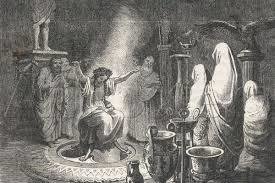1 Introduction
1.1 Romans 3:1-8
Therefore what advantage does the Jew have, or what is the value of circumcision? 2 Actually, there are many advantages. First of all, the Jews were entrusted with the oracles of God. 3 What then? If some did not believe, does their unbelief nullify the faithfulness of God? 4 Absolutely not! Let God be proven true, and every human being shown up as a liar, just as it is written: "so that you will be justified in your words and will prevail when you are judged."
5 But if our unrighteousness demonstrates the righteousness of God, what shall we say? The God who inflicts wrath is not unrighteous, is he? (I am speaking in human terms.) 6 Absolutely not! For otherwise how could God judge the world? 7 For if by my lie the truth of God enhances his glory, why am I still actually being judged as a sinner? 8 And why not say, "Let us do evil so that good may come of it"?-as some who slander us allege that we say. (Their condemnation is deserved!)
1.2 Structure
- 3 parts
- vv 1-8
- vv 9-20
- vv 21f

1.3 An Insincere Apology
- less than an apology
- not genuine repentance
- Jewish response in Romans 1:18 - 2:29
- rebuttal shows willful rebellion
- questions God's righteous judgment
1.4 God's Judgment
- God gave people over to various forms of sin (1:18-32)
- Jews even more guilty
- they professed to adhere to the Law
- they taught others and judged others
- but they did not practice it
- there is no benefit
- like uncircumcision is not a liability to the Law-abiding Gentile
1.5 Overview: Condemning Questions
- the Jews acknowledged their sin
- but they protested God's way of dealing with it
- Series of questions and answers
- Paul may have heard this many times in the Synagogues
- reveal the depth of the unbelief and rebellion

1.6 Purpose
- admonition
- a third "knockout punch"
- principles vital to our Christian walk
- exposes dangerous perspectives
- encouragement
- rejoice in God's grace
- certainty that He will accomplish what He has promised
2 Verse by Verse Observations
2.1 (1) God's condemnation of all as sinners
- All are sinners, guilty before God and deserving of His wrath
- Paul further documents universal fallenness (3:9-20)
- He intensifies his indictment of the self-righteous

2.2 (2) Questions as a primary tool to expose the sin of the Jews
- the questions are more prominent than the answers
- reveals the rebellious and distorted thinking
- answers are brief and to the point
- questions arise from chapters 1 and 2
2.3 (3) Distinct flow to the questions
- Not randomly chosen
- flows to a very strong point
2.4 (4) Arrangement indicates the structure of the passage
- section 1 (1-4)
- verbs are in the past tense
- Jews referred to in the third person
- asks acceptable questions
- outcome is the statement of biblical principles
- section 2 (5-8)
- verbs are the present tense
- Jews referred to in the first person
- inappropriate questions that reveal the sin of those who ask them
- has to qualify his question
- outcome is the realization of how they have perverted God's truth
3 Section 1
3.1 The Benefits of the Jew: Reasons for Rejoicing (1-4)
Therefore what advantage does the Jew have, or what is the value of circumcision? 2 Actually, there are many advantages. First of all, the Jews were entrusted with the oracles of God. 3 What then? If some did not believe, does their unbelief nullify the faithfulness of God? 4 Absolutely not! Let God be proven true, and every human being shown up as a liar, just as it is written: "so that you will be justified in your words and will prevail when you are judged."
3.2 The Questions
- they are technically two questions in verse 1
- in reality, they are one restated
- both arise from 2:25-29
- Jewishness is not an external matter but of the heart
- by their conduct, they are no better than the Gentiles
- their guilt is greater since their revelation was much more complete
3.3 Jewish problem
- No advantage?
- positively pernicious; it enhances their condemnation
- all the privileges given by Moses seem to be a disadvantage

3.4 The Jewish Advantage
- their objection is false
- Paul does not apologize for the question
- "Great in every respect"
- He gives one blessing
- they are entrusted with the "oracles of God"
- nothing similar to others
- also unique relationship to the Jews
- contain God's purposes and promises of blessing
- define sin and its consequences
- define righteousness and its rewards

3.5 Oracles of God
- responses or answers given by an oracle
- communications of God
- the OT are God's very words
- reveal the perfections of God's character
- promise of a Messiah

3.6 The Jewish Response
- not mere possession but ENTRUSTED
- it was to be shared
- blessings to be poured out on all nations
- the Jews were not faithful stewards
- hoarded God's blessings for themselves
- saw their stewardship as punishment
- saw Gentiles as unworthy and themselves as deserving
3.7 The Scriptures
- God's promises of restoration and blessing
- Jews were sinners too, like the Gentiles
- Will God's promises be nullified by the sins of some?
- They are not dependent of the faithfulness of the Jews (2)
- Dependent on God's faithfulness
- God's promises are not thwarted by our unfaithfulness
- "May it never be"
3.8 God forbid
- used several times by Paul in this epistle
- what is rejected is false, even impious
- God is always faithful to His promises
3.9 God's Promises are never Nullified
- the question supposes that only some are unfaithful
- "some" in verse 3
- ALL are unfaithful
- Paul responds in verse 4
- Fulfillment of God's promises depend on God's faithfulness
- not that of us
- God's character is not diminished by human sin
- God's faithfulness is assured in His blessings and divine judgment
- God is true, and every person is a liar
- God's promises include His blessings and promised judgment (Ps 51:4)
3.10 David's Poem
- Nathan rebukes David for his adultery with Bathsheba (2 Sam 12:7,11)
- a Psalm of his confession and repentance
- David also acknowledges God's righteousness in pronouncing judgment on his sins
- a model of repentance
- contrasts the rebellion of the self-righteous Jews
- David gives no excuses or defense for his action
- his sin only highlights the righteousness of God
- David's only hope was God's faithfulness
- not his own good works from the past or future
- Not on the basis of Law but of God's character
- David appeals to God for forgiveness and restoration

3.11 The Heart-warming Truth
- God's Word is His gracious gift
- a privilege that brings responsibility
- His promises are not dependent on our perfect obedience
- But on His faithfulness
- God can be trusted to His Word, even though every human is a liar
- Like David, all Jews should call upon God to forgive and save
4 Section 2
4.1 Romans 3:5-8
5 But if our unrighteousness demonstrates the righteousness of God, what shall we say? The God who inflicts wrath is not unrighteous, is he? (I am speaking in human terms.) 6 Absolutely not! For otherwise how could God judge the world? 7 For if by my lie the truth of God enhances his glory, why am I still actually being judged as a sinner? 8 And why not say, "Let us do evil so that good may come of it"?-as some who slander us allege that we say. (Their condemnation is deserved!)
4.2 God in the Hands of Angry Sinners
- Paul turns from the sublime to the ridiculous
- from the past to the present tense
- from the impersonal to the personal
- from rejoicing to God's judgment
- from legitimate questions to inappropriate ones

4.3 The Connection of the Two Sections
- evils in 5-8 on the basis of the truths in 1-4
- the attitude of the objector is different from David's
- the "heathen" has rejected God's truth and exchanged it for a lie
- the "self-righteous" has received God's truth and has perverted its perspective and practice
- so much so that sin is advocated
- God is indicted for wrongdoing
4.4 Our Unrighteousness demonstrates God's Righteousness
- God's purposes and promises will be fulfilled
- He is faithful even though humans fail
- When people sin, God's words are justified and His judgment prevails
- God gains when people obey and when they don't
- Examples of Jonah and Judas
4.5 Irreverent Question
- Qualifies this question
- Asks on behalf of others and not for himself
- "How can a righteous God punish people for their sin if He benefits from their unrighteousness?"
- Response of dismay and revulsion
- "May it never be!" (6)
- Rebuttal is simple and short
4.6 Explaination
- In this case, God could not judge anyone
- No one can ever sin so that God will be forced to "cut back" on His promises
- No sin has ever diminished the promises of God
- No sin tarnishes God's reputation
- If God only judged those whose sins did Him damage, He would judge no one

4.7 The Same Question Again
- vv 7 and 8 is the same question restated
- God's judgment is questioned and sin is promoted
- "My sin benefits God"
- The end justifies the means
- "God does not need to judge me, since I am doing good"
4.8 Paul sees the illogical conclusion
- "If little sin benefits God, why not an abundance of sin?"
- Paul only has one answer
"The condemnation of those who would advocate this is just indeed."

5 Summary
5.1 Conclusion
- God's Word is a great privilege and a great responsibility
- value depends on we estimate God's Word
- light to the Gentiles
- Our privilege today
5.2 Hebrews 1:1-3
After God spoke long ago in various portions and in various ways to our ancestors through the prophets, 2 in these last days he has spoken to us in a son, whom he appointed heir of all things, and through whom he created the world. 3 The Son is the radiance of his glory and the representation of his essence, and he sustains all things by his powerful word, and so when he had accomplished cleansing for sins, he sat down at the right hand of the Majesty on high.
5.3 1 Peter 1:10-13
Concerning this salvation, the prophets who predicted the grace that would come to you searched and investigated carefully. 11 They probed into what person or time the Spirit of Christ within them was indicating when he testified beforehand about the sufferings appointed for Christ and his subsequent glory. 12 They were shown that they were serving not themselves but you, in regard to the things now announced to you through those who proclaimed the gospel to you by the Holy Spirit sent from heaven-things angels long to catch a glimpse of.
13 Therefore, get your minds ready for action by being fully sober, and set your hope completely on the grace that will be brought to you when Jesus Christ is revealed.
5.4 2 Peter 1:16-21
For we did not follow cleverly concocted fables when we made known to you the power and return of our Lord Jesus Christ; no, we were eyewitnesses of his grandeur. 17 For he received honor and glory from God the Father, when that voice was conveyed to him by the Majestic Glory: "This is my dear Son, in whom I am delighted." 18 When this voice was conveyed from heaven, we ourselves heard it, for we were with him on the holy mountain. 19 Moreover, we possess the prophetic word as an altogether reliable thing. You do well if you pay attention to this as you would to a light shining in a murky place, until the day dawns and the morning star rises in your hearts. 20 Above all, you do well if you recognize this: No prophecy of scripture ever comes about by the prophet's own imagination, 21 for no prophecy was ever borne of human impulse; rather, men carried along by the Holy Spirit spoke from God.
5.5 Luke 12:48
- The more we hoard God's blessings, the more we forfeit them
But the one who did not know his master's will and did things worthy of punishment will receive a light beating. From everyone who has been given much, much will be required, and from the one who has been entrusted with much, even more will be asked.

5.6 Conclusion
- the unfaithfulness of people will never frustrate the faithfulness
of God
- the certainty of all God's promises rests on His character
- Moses appeals to God on the basis of God's character
- should not be an excuse for failure
- but reason for obedience
5.7 Romans 11:29
For the gifts and the call of God are irrevocable.
5.8 2 Timothy 2:13
If we are unfaithful, he remains faithful, since he cannot deny himself.
5.9 Deut 31:6; Joshua 1:5; Heb 13:5
I will never desert you, nor will I ever forsake you.
5.10 1 Thessalonians 5:24
He who calls you is trustworthy, and he will in fact do this.
5.11 Hebrews 10:23
And let us hold unwaveringly to the hope that we confess, for the one who made the promise is trustworthy.
5.12 1 Peter 4:19
So then let those who suffer according to the will of God entrust their souls to a faithful Creator as they do good.
5.13 Revelation 19:11; also 1:5; 3:14
Then I saw heaven opened and here came a white horse! The one riding it was called "Faithful" and "True," and with justice he judges and goes to war.
5.14 Revelation 22:6a; 21:5
Then the angel said to me, "These words are reliable and true."
5.15 Conclusion
- rejecting God's revelation darkens the mind and perverts truth
- God's judgment is just and gracious for all who repent
deck
By Jonathan Bangera
deck
- 405



